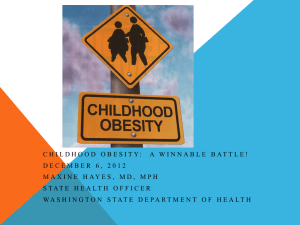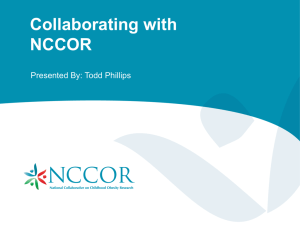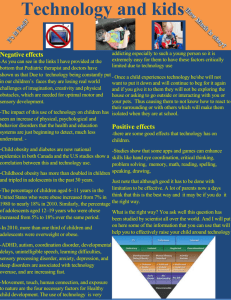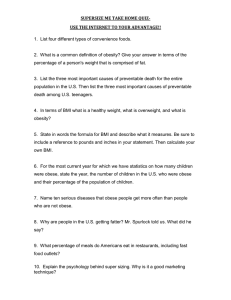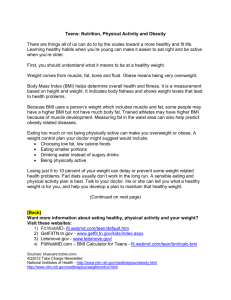Word - BlueCare Tennessee
advertisement
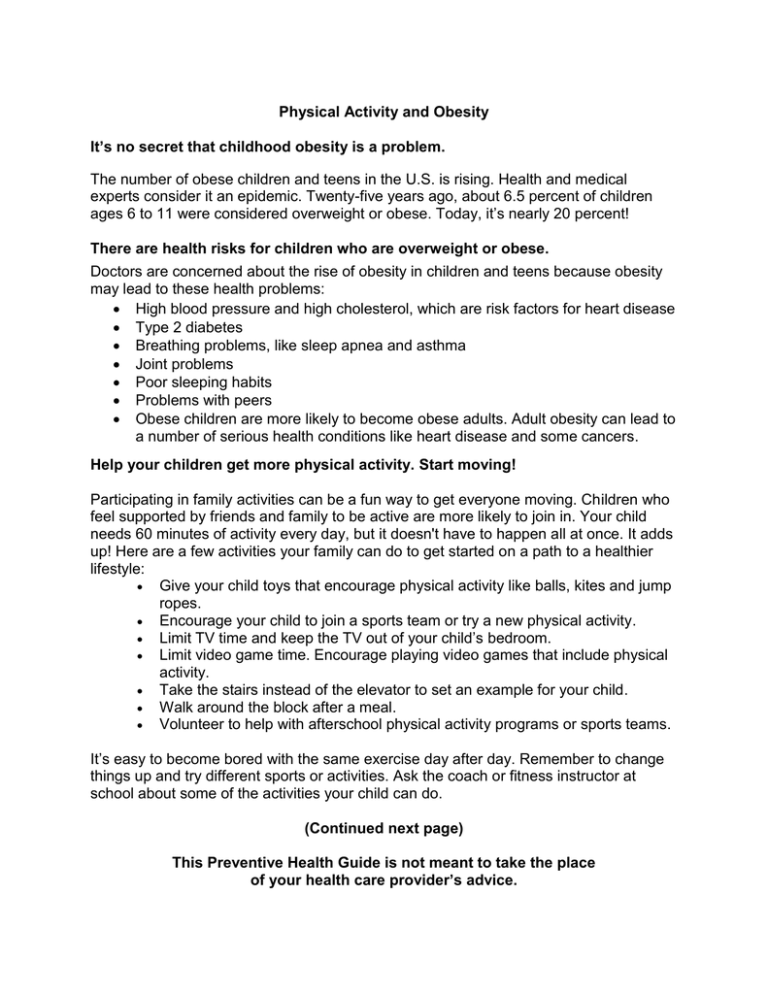
Physical Activity and Obesity It’s no secret that childhood obesity is a problem. The number of obese children and teens in the U.S. is rising. Health and medical experts consider it an epidemic. Twenty-five years ago, about 6.5 percent of children ages 6 to 11 were considered overweight or obese. Today, it’s nearly 20 percent! There are health risks for children who are overweight or obese. Doctors are concerned about the rise of obesity in children and teens because obesity may lead to these health problems: High blood pressure and high cholesterol, which are risk factors for heart disease Type 2 diabetes Breathing problems, like sleep apnea and asthma Joint problems Poor sleeping habits Problems with peers Obese children are more likely to become obese adults. Adult obesity can lead to a number of serious health conditions like heart disease and some cancers. Help your children get more physical activity. Start moving! Participating in family activities can be a fun way to get everyone moving. Children who feel supported by friends and family to be active are more likely to join in. Your child needs 60 minutes of activity every day, but it doesn't have to happen all at once. It adds up! Here are a few activities your family can do to get started on a path to a healthier lifestyle: Give your child toys that encourage physical activity like balls, kites and jump ropes. Encourage your child to join a sports team or try a new physical activity. Limit TV time and keep the TV out of your child’s bedroom. Limit video game time. Encourage playing video games that include physical activity. Take the stairs instead of the elevator to set an example for your child. Walk around the block after a meal. Volunteer to help with afterschool physical activity programs or sports teams. It’s easy to become bored with the same exercise day after day. Remember to change things up and try different sports or activities. Ask the coach or fitness instructor at school about some of the activities your child can do. (Continued next page) This Preventive Health Guide is not meant to take the place of your health care provider’s advice. [back] Make smart food choices a family project: Cut down on fat and sugar. Bake or grill instead of fry. Switch to low or non-fat milk, yogurt and cheese. Switch to lower sugar breakfast cereals. Teach healthy snacks to your child. Keep fresh fruits and vegetables and whole grain foods on hand and ready to eat. Don’t forget about portion sizes. Use smaller plates for children. Don't force them to clean their plates if they are full. Portions should be about the size of the back of a fist—a child’s fist for a child’s portion. Avoid pre-packaged snack foods, soft drinks, sport drinks and fruit juices. Keep a food journal of everything that you and your child eat. Then you can talk with your doctor or your child’s doctor about your choices. Drink plenty of water throughout the day. It helps foods digest and keeps the body cooler. Be a healthy role model by eating healthy yourself. Want more information about helping your child stay at a healthy weight? Here are some websites to visit: 1) Centers for Disease Control and Prevention www.cdc.gov/obesity/childhood/index.html 2) Let’sMove.gov - www.letsmove.gov/ 3) Teen’sHealth.org - teenshealth.org/teen/food_fitness/ Sources: bluecare.bcbst.com; Let’s Move - www.letsmove.gov/active-families;http://www.letsmove.gov/health-problems-and-childhoodobesity; www.letsmove.gov/learn-facts/epidemic-childhood-obesity TeensHealth.org(Nemours) - teenshealth.org/teen/food_fitness/wellbeing/exercise_wise.html# Centers for Disease Control and Prevention - cdc.gov/obesity/childhood/basics.html; www.cdc.gov/obesity/childhood/problem.html; www.cdc.gov/healthyweight/children ¿Habla español y necesita ayuda con esta carta? Llámenos gratis al BlueCare 1800-468-9698. Llámenos gratis al TennCareSelect 1-800-263-5479. We do not allow unfair treatment in TennCare. No one is treated in a different way because of race, color, birthplace, religion, language, sex, age, or disability. Do you think you’ve been treated unfairly? Do you have more questions or need more help? If you think you’ve been treated unfairly, call the Family Assistance Service Center for free at 1-866-311-4287. In Nashville, call 743-2000. If you have a hearing or speech problem you can call us on a TTY/TDD machine. Our TTY/TDD number is 1-800-226-1958. Do you have a mental illness and need help with this information? The TennCare Advocacy Program can help you. Call them for free at 1-800-758-1638. Need help in another language? You can call TennCareSelect for assistance in any language at 1-800-263-5479. Call BlueCare for assistance in any language at 1-800468-9698. Interpretation and translation services are free to TennCare members. BlueCare Tennessee and BlueCare, Independent Licensees of BlueCross BlueShield Association.
